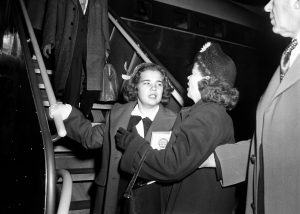Katy Waldman in The New Yorker:
 Sally Horner was a widow’s daughter, a brown-haired honor student, from Camden, New Jersey. In 1948, hoping to impress some popular girls, she nicked a notebook from a dime store and was accosted by a man, Frank La Salle, posing as an F.B.I. agent. La Salle, who told Horner his name was Frank Warren, informed the eleven-year-old that he was placing her under surveillance. Then he commanded her to take a bus with him to Atlantic City, and from there they embarked on a cross-country road trip. Like Humbert Humbert, the protagonist of the novel “Lolita,” by Vladimir Nabokov, La Salle concealed his predations by posing as his victim’s father. (In the book, Humbert actually becomes Dolores Haze’s stepfather.) After enduring twenty-one months of rape and abuse, Sally finally opened up to a neighbor, Ruth Janisch, and found the strength to telephone her family back in Camden; the F.B.I. recovered her from a trailer park in Southern California and arrested La Salle, who confessed and went to prison for the rest of his life. In 1952, two years after her rescue, Sally was killed in a car crash.
Sally Horner was a widow’s daughter, a brown-haired honor student, from Camden, New Jersey. In 1948, hoping to impress some popular girls, she nicked a notebook from a dime store and was accosted by a man, Frank La Salle, posing as an F.B.I. agent. La Salle, who told Horner his name was Frank Warren, informed the eleven-year-old that he was placing her under surveillance. Then he commanded her to take a bus with him to Atlantic City, and from there they embarked on a cross-country road trip. Like Humbert Humbert, the protagonist of the novel “Lolita,” by Vladimir Nabokov, La Salle concealed his predations by posing as his victim’s father. (In the book, Humbert actually becomes Dolores Haze’s stepfather.) After enduring twenty-one months of rape and abuse, Sally finally opened up to a neighbor, Ruth Janisch, and found the strength to telephone her family back in Camden; the F.B.I. recovered her from a trailer park in Southern California and arrested La Salle, who confessed and went to prison for the rest of his life. In 1952, two years after her rescue, Sally was killed in a car crash.
“The Real Lolita” is Sarah Weinman’s attempt to pull back the veil on the kidnapping that may have helped inspire Nabokov’s novel.
More here.
